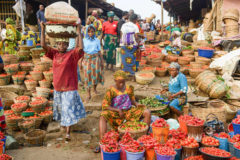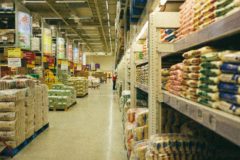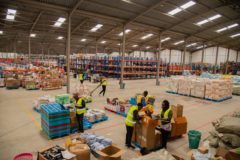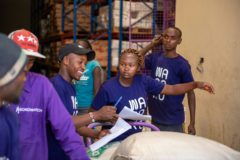Jumia urgently needs to become profitable across its 11 African markets. To drive this, the Nigerian arm of the ecommerce giant is looking to rural markets where ecommerce potential is untapped. How will this strategy play out?
In a bid to become profitable, pan-African ecommerce platform Jumia has turned its focus to rural markets in Africa. This means convincing rural dwellers that they can buy anything with their mobile phones, and Jumia will bring the product to them. Since 2022, the Nigeria arm of the e-commerce giant has doubled down on rural and semi-rural markets in Africa’s most populated country. “This is in line with the master plan to be profitable,” says Massimiliano Spalazzi, CEO of Jumia Nigeria.
Modaleke in Osun, Nkpor in Anambra, Owo in Ondo, Offa in Kwara, and Keffi in Nassarawa are some of the towns that are now being touched by ecommerce with Jumia as a first mover. Jumia is partnering with third parties in these towns to set up fulfilment centres to serve as pick-up stations (PUS) for the customers. In its recently released Rural Area Report, Jumia shows that it has established over 250 PUS across the country, even in the remotest parts where it is striving to plant its ecommerce roots.
“To be profitable, you must boost gross merchandise value (GMV). And to do that, you must record more sales or have more customers. Our rural drive is bringing more customers on board. It’s positioning us better towards profitability,” Spalazzi shared, maintaining that the logistics costs associated with its rural markets are marginal. At an average shipping cost of $1.5 per item, Jumia claims it does not record losses in fulfilling orders for rural customers.
JForce is the team behind the dream
Over the years, Jumia has consistently splurged on marketing and advertising costs as it continues to position itself in the African market. But billboard ads don’t do much to convert middle-class Nigerians who provide the largest market opportunity for B2C ecommerce in the country. Jumia realises this. Now, the company has taken deliberate steps to prune its advertising spend, cutting it down by 40% in Q4 2022, and concentrating its marketing efforts on its 43,000-strong independent sales consultants, JForce.
JForce represents the company’s approach to rural area marketing. Through on-the-ground campaigns, activations, and door-to-door canvassing, JForce teams across the country educate and onboard users on Jumia, including those with limited exposure to education or technology. In return, Jumia pays them commissions for every order they facilitate. These commissions range from 1.5% to 8% and are based on the locations from which the orders are completed. “[JForce have] been instrumental in expanding ecommerce to previously underserved areas [in Nigeria],” the Jumia Rural Report reads.
Rural seems to be winning
Jumia’s concentration on rural marketing through sales agents may mark the early stages of a gradual shift in the B2C ecommerce spectrum from an Amazon-styled structure to something more Copia-esque. Copia Global is one of the most successful B2C ecommerce companies in Africa. Based in Kenya and Uganda, the company recruits small business owners and trains them to be agents and Copia evangelists in their regions, with their local stores serving as pick-up locations for customers. This hyperlocal model reinforces trust in Copia and enables the company to deliver goods profitably despite its free delivery. Jumia has an advantage here: its delivery is not free, and the addition of a $2 fee to most items will make little difference in remote towns, where traditional commerce and logistics spike the pricing of several items.
Another advantage for Jumia lies in the marginal costs of its logistics to these stores. On Nigeria’s map, the remote towns that Jumia operate in can be traced within a radius of Lagos. According to Spalazzi, most of the rural markets Jumia currently serves are situated on the road route to bigger, urban cities, such as Benin, Warri, Aba, and Abuja, where Jumia reports consistently increasing order volumes. “It makes sense to us to take advantage of our logistics routes to better serve areas where ecommerce lacks presence,” the CEO said.

Nigeria and Robert Awodu, Head of PR and Communications, Jumia Nigeria at the launch of
Jumia’s ‘E-Commerce in Rural Report’ held in Lagos on Tuesday, July 4th.
Playing the long game
Experts agree that Jumia’s move to deepen its rural market may not immediately fruit the kind of changes that radically upturns its balance sheet towards a positive EBITDA. But it holds a promise to boost Jumia’s average orders and GMV values recorded from Nigeria.
Between the last quarter of 2022 and the first quarter of 2023, orders on Jumia dipped by 3 million units, which is reflected in its reduced GMV and quarterly revenue. To prevent these business-altering kinds of dips, Jumia must increase its presence in new markets and gradually plug into more markets where middle-class Africans can purchase items. There are over 50 million Nigerians in this category, according to data from Resource Recycling. And as Jumia remains the dominant B2C ecommerce player in the Nigerian market, there’s hardly any justification for its quarterly active customers to keep oscillating around 3 million customers.
Jumia is playing the long game by building a capillary network among rural and semi-rural towns in Nigeria. A good number of the so-called rural towns—including Ilaro, Offa, Nkpor and Keffi—already have tertiary institutions, electricity, and other markers of urbanisation. This means that other things being equal, they could transform into semi-urban or urban cities within the next half-decade. This could translate into an explosion of market size for the ecommerce first movers, which Jumia is striving to be in these towns.
Jumia Nigeria is putting to test the words of Francis Dufay, the group’s CEO: “We [Jumia] have great business cases in smaller cities close to rural areas, where we know for a fact that we have a good market.”
It will be interesting to see how this good market plays out in the company’s 2023 financials.




















